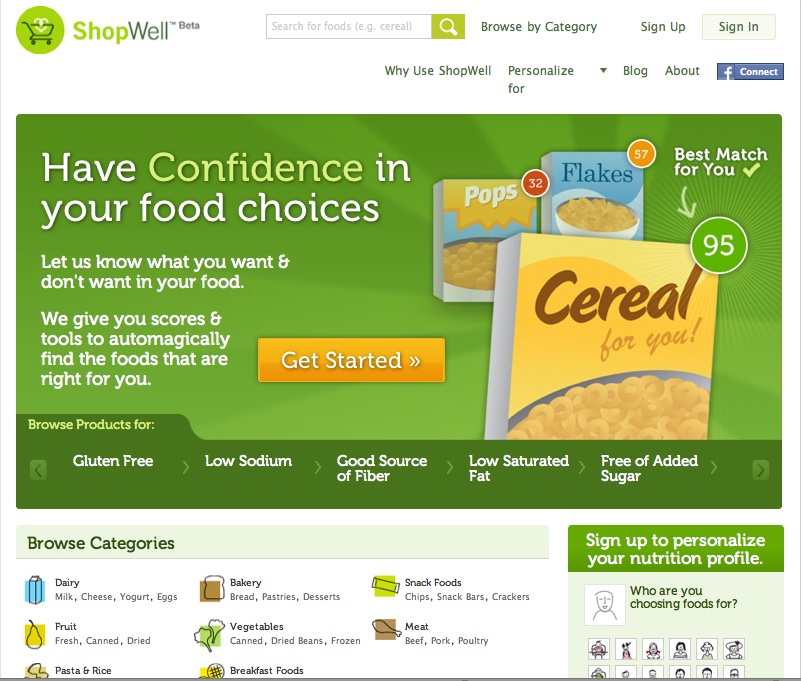If you’ve been following this blog, you may have noticed that many of the startups I’ve interviewed are data-driven. Why? Because addressing even the seemingly most basic food system challenges, such as what to eat, requires the management of large amounts of data. I’ve spent the last eleven months speaking with people about ways t0 incentivize the sharing of both corporate and consumer data, which could be used to develop better products, promote better research, and improve public policy making. As you might imagine, however, most large food manufacturers are reticent to share their proprietary data and consumers are becoming increasingly wary as well. Nonetheless, I am convinced that there are ways of motivating them, which is why I’m really excited about ShopWell’s business model.
ShopWell is a free grocery and nutrition advisor site that allows consumers to rate products based on their customized needs. Its goal is to empower people to make better decisions about their health and what they consume. ShopWell’s business model, stated clearly under the “How We Make Money” section, is to monetize the market research insights gained through consumer use of the website and app. What’s interesting about ShopWell’s approach is that a) it’s completely upfront about its intentions and b) it uses the data to improve the development of products. By being honest and transparent about the use of data, it is able to build trust with consumers. The well designed personalization tool creates a mutually beneficial way of aggregating valuable data. Corporations benefit from this trust and the valuable insights that are nearly impossible for them to obtain on their own. ShopWell CEO Brian Witlin was kind enough to answer my questions about ShopWell and the success of its business model.
Danielle Gould: What problem does ShopWell solve? Why do you think this is the best way to do it?
Brian Witlin: Everyone wants to eat better, but in a world of conflicting claims, confusing diet books, impenetrable nutrition labels, and thousands of food choices, shopping for groceries that fit people’s diverse lifestyles can be challenging.
Moreover, health is not a one-size-fits-all proposition. What’s best for one person is not what’s best for another—imagine a pretty normal family where the daughter has a peanut allergy, dad needs low cholesterol food, and mom is seeking good sources of protein. With so many variables in individuals’ needs and in food content, ShopWell aims to provide a tool that helps people understand their food choices through a simple, practical lens.
ShopWell takes the tremendous amount of data in ingredient lists and nutrition facts labels and presents it in a way that is clean, easy-to-understand and tailored to an individual’s unique needs, whether these needs be related to a medical condition (i.e., diabetes) or an ingredient preference (i.e., wanting to avoid high fructose corn syrup). Empowered with this information, consumers can shop smarter, and eat better.
DG: How are you different from Nuval or other rating systems?
BW: ShopWell is a free, food information site that delivers the only personalized nutrition resource–online and on the iPhone–for consumers who want to make healthy choices about the food they buy at the grocery store. ShopWell simplifies the nutrition experience so that consumers can quickly make grocery shopping decisions that are genuinely right for them, as unique individuals.
We support the work of all initiatives that aim to empower consumers with better information to make healthier choices. ShopWell is distinct from several other sites in so far as it is truly personalized to the health goals and needs of each unique individual. The score and highlighted information that one consumer receives from ShopWell will always be different from another individual with different stated preferences, gender, age, etc. We believe that such detailed personalization will enable consumers to really feel confident in their personal food choices.
DG: Why do you think IDEO was interested in funding the site?
BW: To clarify, IDEO initiated the process that led to ShopWell by asking ‘How might we help people be more mindful about they eat.’ Subsequently, IDEO helped incubate and research the early prototype of ShopWell, and continues to add value through strategic support. ShopWell’s financing comes from traditional venture capital, angel funding, and IDEO.
DG: Why do you think large food manufacturers have been interested in speaking with ShopWell?
BW: Food manufacturers of all sizes have been interested in ShopWell. They are hungry for better, real-time data about consumers’ food preferences. For small and mid-sized manufactures, ShopWell is providing access to data that has been too expensive and too high-level to be genuinely useful. For large manufacturers, ShopWell provides them with more accessible, customized, and current information than is otherwise available.
DG: Is there any information that you can provide food manufacturers that they are not able to obtain on their own?
BW: The greatest need that manufacturers have articulated to ShopWell is the need to get to the ‘why’ behind the data. It takes a triangulation of efforts–from traditional market research to web 2.0 data analytics–to answer that difficult ‘why’ question.
DG: What are the major challenges you have faced?
BW: Our challenges are minimal relative to that of individuals who are facing critical decisions about how to eat, but can’t find the right information to help them do so.
DG: Over the past couple of months various government agencies have opened up their data as part of the open government initiative. Have you noticed an increased availability of food related data? From which agencies have you obtained data? What has the quality been like?
BW: ShopWell has undoubtedly benefited from the US government’s increased interest in sharing data, not to mention the focus that the current Obama Administration has placed on healthy eating in the US. We have leveraged the USDA database of fresh food by coupling it with high quality images to ensure that information on fresh food is as accessible to consumers as is information about more shelf-stable products. ShopWell intends to represent the average grocery store experience as much as possible.
DG: What kinds of outcomes would you like to see? How will they be measured?
BW: ShopWell’s long-term vision is to help consumers feel that health can be as easily understood as price. Additionally we would like to help consumers continually optimize their shopping lists with a key focus around health.
We are continuing to find ways to better measure the impact of our service with our users. In the short-term, we want to get peoples’ New Year’s resolutions off on the right foot! Stay tuned for more….




